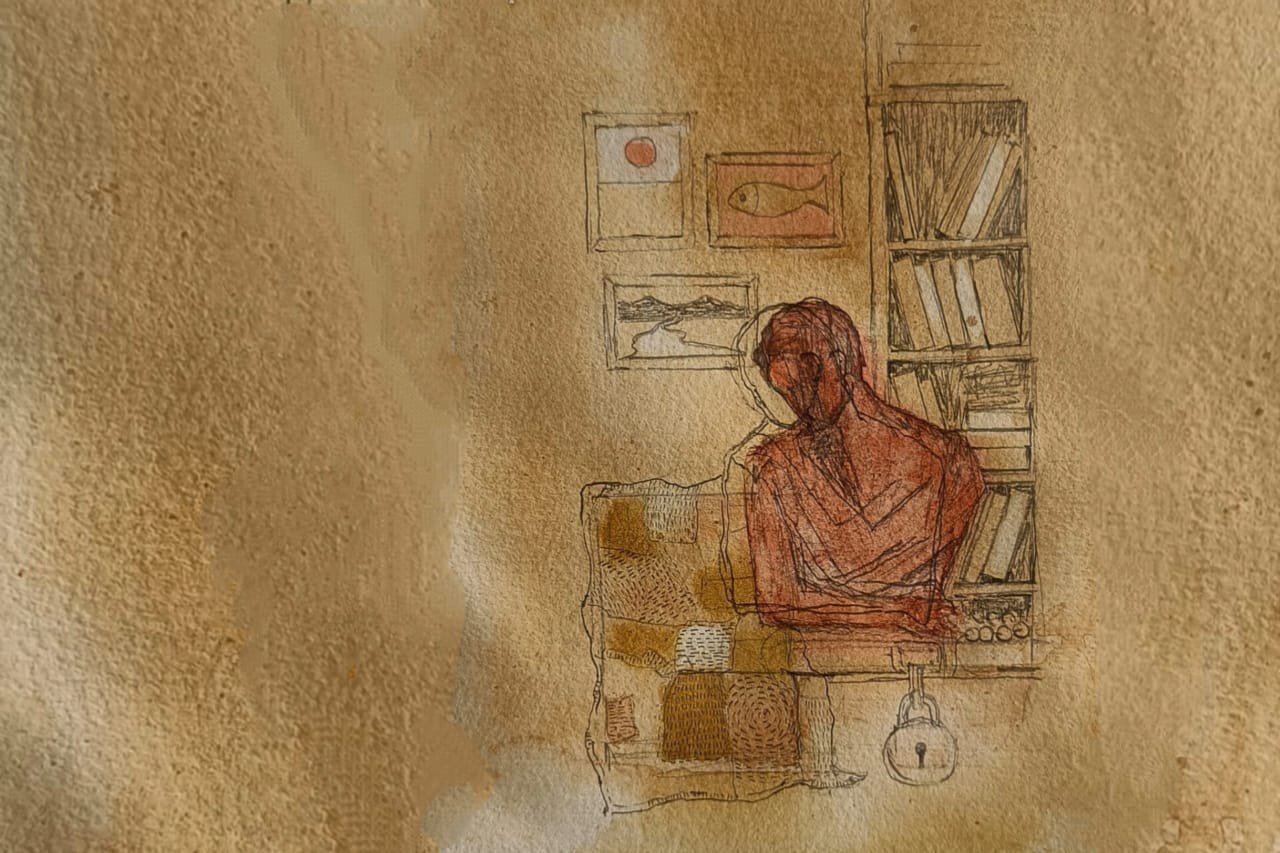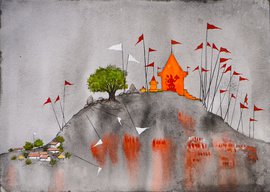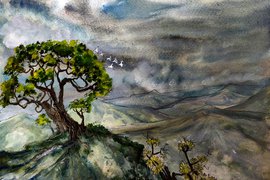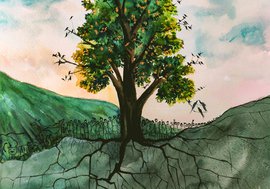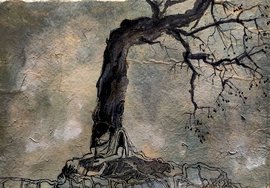It is in poetry that we live fully; in verse that we suffer the most painful divisions that we create between human beings and the society. This is the space for despair, condemnation, questioning, comparisons, memories, dreams, possibilities. It is through here that the road leads us on both sides our main door – inside as well as outside. And that is why it is when we stop listening to poetry, that we lose empathy both as an individual and as a society.
We present Jitendra Vasava’s poem originally written in Dehwali Bhili, using the Devanagari script.
कविता उनायां बोंद की देदोहो
मां पावुहूं! तुमुहुं सोवता पोंगा
बाठे बांअणे बोंद की लेदेहें
खोबोर नाहा काहा?
तुमां बारे हेरां मोन नाहां का
बारे ने केड़ाल माज आवां नाह द्याआ
मान लागेहे तुमुहूं कविता उनायां बोंद की देदोहो
मांय उनायोहो
दुखू पाहाड़, मयाल्या खाड़्या
इयूज वाटे रीईन निग्त्याहा
पेन मां पावुहूं! तुमुहुं सोवता पोंगा
बाठे बांअणे बोंद की लेदेहें
खोबोर नाहा काहा?
तुमां बारे हेरां मोन नाहां का
बारे ने केड़ाल माज आवां नाह द्याआ मोन
मान लागेहे तुमुहूं कविता उनायां बोंद की देदोहो
पेन मां पावुहू!
तुमुहू सौवता डोआं खुल्ला राखजा मासां होच
बास तुमुहू सोवताल ता ही सेका
जेहकी हेअतेहे वागलें लोटकीन सौवताल
तुमुहू ही सेका तुमां माजर्या दोर्याले
जो पुनवू चादू की उथलपुथल वेएत्लो
तुमुहू ही सेका का
तुमां डोआं तालाय हुकाय रियिही
मां पावुहू! तुमनेह डोगडा बी केहेकी आखूं
आगीफूंगा दोबी रेताहा तिहमे
तुमुहू कोलाहा से कोम नाहाँ
हाचो गोग्यो ना माये
किही ने बी आगीफूंगो सिलगावी सेकेह तुमनेह
पेन मां पावुहूं! तुमुहुं सोवता पोंगा
बाठे बांअणे बोंद की लेदेहें
खोबोर नाहा काहा?
तुमां बारे हेरां मोन नाहां का
बारे ने केड़ाल माज आवां नाह द्याआ मोन
मान लागेहे तुमुहूं कविता उनायां बोंद की देदोहो
तुमुहू जुगु आंदारो हेरा
चोमकुता ताराहान हेरा
चुलाते नाहां आंदारारी
सोवताला बालतेहे
तिया आह्लीपाहली दून्या खातोर
खूब ताकत वालो हाय दिही
तियाआ ताकात जोडिन राखेहे
तियाआ दुन्याल
मां डायी आजलिही जोडती रेहे
तियू डायि नोजरी की
टुटला मोतिई मोनकाहाने
आन मां याहकी खूब सितरें जोडीन
गोदड़ी बोनावेहे, पोंगा बाठा लोकू खातोर
तुमुहू आवाहा हेरां खातोर???
ओह माफ केअजा, माय विहराय गेयलो
तुमुहुं सोवता पोंगा
बाठे बांअणे बोंद की लेदेहें
खोबोर नाहा काहा?
तुमां बारे हेरां मोन नाहां का
बारे ने केड़ाल माज आवां नाह द्याआ मोन
मान लागेहे तुमुहूं कविता उनायां बोंद की देदोहो
Since you've stopped listening to poetry
Brother! I don’t know
why you’ve closed all the doors to your house.
Is it because you don’t want to look outside?
Or is it to stop anyone from coming inside?
I guess you’ve stopped listening to poetry.
I have heard that,
the mountains as tall as our miseries
and the rivers that flow like love,
both are right there,
but you have closed the doors to your house.
I don’t know why.
Is it because you don’t want to look outside?
Or is it to stop anyone from coming inside?
I feel that you’ve stopped listening to poetry.
Oh, brother! Keep your eyes open like a fish,
just so that you can see yourself,
Hanging upside down like an owl
you can see the ocean inside
that once used to get restless
on seeing the blue full moon in the sky.
The lakes have dried up in your eyes.
But oh, brother, I cannot say you are a stone,
How can I? Even a stone has fires hidden inside.
You are more like a coal.
Did I say that right or not?
Any old flame from anywhere can
set you afire.
But brother, you have closed all the doors to your house.
I don’t know why.
Is it because you don’t want to look outside?
Or is it to stop anyone from coming inside?
I feel that you’ve stopped listening to poetry.
Look at the darkness gathering in the sky,
look at the twinkling stars
They don’t fear the darkness
They don’t fight it either
They just light themselves up
for the rest of the world around them.
The sun is the powerful one.
His strength keeps this world together.
My old grandmother is always stringing together
a broken necklace of beads,
with her hazy, weak eyes.
And my mother weaves a quilt for all of us,
putting many a torn piece of cloth together.
Would you like to come and see?
Oh, I am sorry I forgot.
You have closed the door of your house.
I don’t know why.
Is it because you don’t want to look outside?
Or is it to stop anyone from coming inside?
I feel that you’ve stopped listening to poetry.
Translated from Dehwali Bhili and Hindi by Pratishtha Pandya
